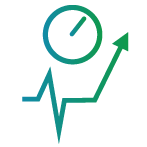
Hypertension
Narrow blood vessels increase the barrier to blood flow. The smaller your arteries, the more resistance and, thereby, your blood pressure. High blood pressure for a long time can result in various health problems, including heart disease. Hypertension is prevalent and develops over several years. There are no noticeable symptoms. However, even in the absence of symptoms, high blood pressure can damage blood vessels and organs, including the brain, heart, eyes, and kidneys.
Early diagnosis in such cases is crucial. Routine blood pressure checkups might help in the early detection of any changes. In case of high blood pressure, your doctor may monitor it for a while to see if there is any improvement.
Hypertension tests should be performed to measure the pressure in the arteries while the heart contracts. A blood pressure test may be performed as part of a standard physical examination or as a screening for hypertension. Some individuals monitor their blood pressure at home using home monitors. Both prescription medications and healthy lifestyle modifications are used to treat hypertension. If the condition worsens, it might result in health problems such as a heart attack or a stroke.
- Tests: 6
When Is A Hypertension Test Prescribed?
The measurement of blood pressure is a standard component of most health examinations. The frequency with which your blood pressure should be monitored depends on your age and overall health.
For those aged 18 and more with normal blood pressure and without any risk factor of heart disease, blood pressure should be monitored at least once every two to five years. People above 40 years and with a greater risk of hypertension should get their blood pressure checked annually. Chronic health issues, such as high or low blood pressure or heart disease, may necessitate more frequent blood pressure monitoring.
Your doctor may also recommend that you monitor your blood pressure at home. Automatic blood pressure monitors for the home are simple to operate. Some can be linked to a computer or mobile device, allowing you to transmit the data to an online medical record. It is advisable to record your home blood pressure measurements. Additionally, have your care provider examine your monitor annually to ensure accurate readings.
Why is Hypertension Test Important?
When the heart beats, it forces blood throughout the body via the arteries. If blood flows against the artery walls with excessive force, the blood pressure rises. If left untreated, it can lead to health issues such as stroke and/or heart attack.
Blood pressure fluctuates significantly with age; our arteries get stiffer as we age. Blood pressure can also fluctuate during the day. Typically, our blood pressure is highest in the morning, rises when we work, play, or are under stress, and falls while we sleep.
However, if our blood pressure remains high for an extended period, it might create significant health issues. Very often, the symptoms of hypertension go unnoticed. Hence, it is essential to have your blood pressure checked frequently.
How Is The Test For Hypertension Performed?
A person's blood pressure is often measured while seated in a chair with their feet flat on the floor and their arm resting at heart level. The blood pressure cuff is firmly wrapped around the upper arm. The base of the cuff is situated directly above the elbow. The cuff should fit properly. If the cuff is too wide or too tiny, blood pressure measurements might fluctuate. Blood pressure measurements can be done using a machine. This is known as a computerized measurement.
Without any machine, blood pressure can also be measured manually. The care practitioner places a stethoscope over the primary artery in the upper arm (brachial artery) to listen to blood flow during a manual blood pressure measurement. The cuff is inflated using a pump. As the cuff inflates, the arm is compressed. Blood flow across the artery ceases momentarily. The healthcare professional carefully releases the air from the cuff by opening a valve on the hand pump to restore blood flow. The clinician continues to monitor the patient's blood flow, pulse, and blood pressure.
The blood pressure cuff automatically inflates and monitors the pulse for automated measurements. In this instance, a stethoscope is not required. It takes around one minute to assess blood pressure.
When Do You Receive Your Test Results?
Your health care practitioner can immediately give your blood pressure test result.
Blood pressure is measured in mercury millimeters (mm Hg). A blood pressure reading consists of two numbers:
The systolic blood pressure represents the pressure when the heart muscle contracts and pumps blood against the walls of the arteries. The diastolic blood pressure is the pressure exerted between heartbeats.
Worried you might have Hypertension? Get an early diagnosis to avoid bigger health risks.?
Frequently Asked Questions
Home blood pressure monitoring is measuring your blood pressure at home (HBPM) using a blood pressure device. In recent years, HBPM has become considerably simpler and more accurate, and it is now a viable tool for diagnosing hypertension and aiding in its management.
A digital blood pressure monitor typically costs between Rs 1,500 and Rs 2,500, depending on the manufacturer, features, discount, and other factors.
The accuracy of home blood pressure monitors is not always as high as it should be. In 5% to 15% of people, depending on the criteria for accuracy, home blood pressure monitors may be erroneous. For a more accurate test, book hypertension tests at Metropolis, which is one of the most renowned centers in India, with reasonable hypertenstion tests prices.


